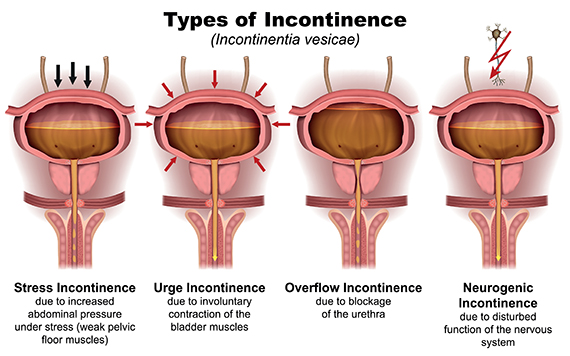Urinary Incontinence Q&A
What causes urinary incontinence?
Urinary incontinence is the involuntary leakage of urine, ranging from small dribbles to full bladder emptying. This condition often arises due to weakened pelvic floor muscles or nerve dysfunction that impairs bladder control.
Certain factors, such as urinary tract infections, caffeine or alcohol consumption, and some medications, can also temporarily increase urine production, leading to transient urinary incontinence.
How is urinary incontinence diagnosed?
At InfiniHealth Medical Group, advanced diagnostic tools help identify the cause and severity of urinary incontinence.
These include:
- Urodynamic Studies A series of tests to measure bladder pressure, urine flow, residual urine volume, and the ease of starting and stopping urination.
- High-Resolution Ultrasonography This imaging technique provides detailed visuals of your urinary tract to pinpoint abnormalities.
- Video Cystoscopy This diagnostic procedure involves a thin tube with a camera to examine the bladder and urethra, allowing your provider to assess structural or functional issues.
Contact Us
What are the types of urinary incontinence?
Both men and women can experience various types of urinary incontinence, including:

- Stress Incontinence This type occurs when pressure on the bladder, caused by activities such as laughing, coughing, sneezing, or lifting heavy objects, leads to unexpected urine leakage. Women often develop stress incontinence due to pregnancy, childbirth, or hormonal changes during menopause that weaken pelvic floor muscles. In men, stress incontinence is more common after prostate surgery.
- Urge Incontinence Also known as overactive bladder, this type leads to a sudden, intense urge to urinate, often resulting in leakage before reaching the bathroom.
- Functional Incontinence Functional incontinence happens when physical disabilities, cognitive impairments, communication challenges, or environmental obstacles prevent someone from getting to the restroom in time.
- Overflow Incontinence This type causes frequent dribbling of urine and the sensation that your bladder is never fully empty.
How is urinary incontinence treated?
InfiniHealth Medical Group’s specialists develop personalized treatment plans tailored to your specific needs, which may include:
- Bladder Training Techniques to improve bladder control and reduce the frequency of leaks.
- Medications Prescription drugs to address underlying causes or reduce symptoms.
- Pelvic Floor Therapy and Biofeedback Exercises and feedback mechanisms to strengthen pelvic muscles and improve bladder control.
How is urinary incontinence treated?
- Minimally Invasive Treatments Options such as urethral bulking injections, ThermiVa®, or InterStim® therapy to enhance bladder control.
- Surgical Interventions Procedures like urethral slings or artificial urinary sphincters for severe cases.
- Nerve Stimulation Therapies Peripheral tibial nerve stimulation to improve communication between nerves and the bladder.
Don’t let urinary incontinence affect your quality of life.
Start your journey to confidence and comfort with InfiniHealth Medical Group today.
Get the Help You Deserve
Urinary incontinence can significantly impact your quality of life, but it doesn’t have to.
The skilled team at InfiniHealth Medical Group offers compassionate care and effective solutions to help you regain control and confidence.
Call today or book an appointment online to take the first step toward relief.
